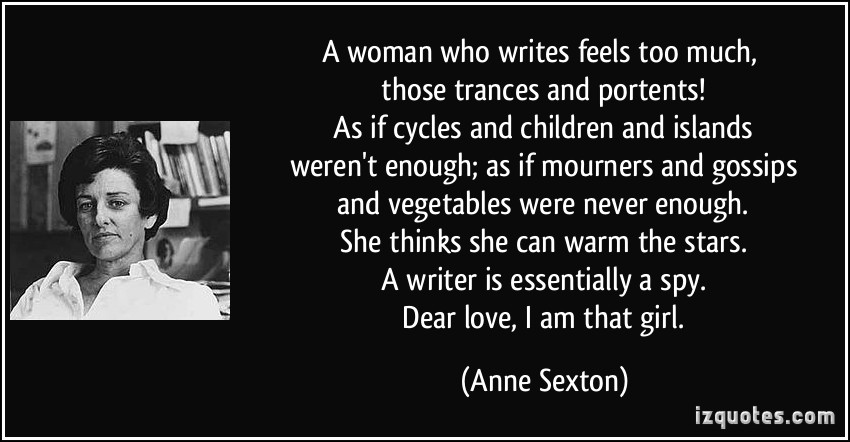Poets are a special breed, able to capture an emotion, thought, or situation in a few words or with a particular phrase that resonates so deeply within us that everything else melts away. Poetry requires the writer to enter an altered state of consciousness that is often so extreme the artist is swept up in the creation, lost inside of it, and merges with whatever he or she has created.
Anne Sexton was that kind of poet, a paradox, a woman who came of age in the fifties and sixties and tackled taboos in a way that few other female writers had at the time. Abortion, menstruation, incest, adultery, sexuality, masturbation, drug addiction, depression, suicide and death. These days, such topics are the stuff of TV talk shows, but in Sexton’s era, propriety didn’t look kindly on open discussions of this kind of stuff.
After the birth of her first daughter, she suffered from post partum depression and in 1954, suffered her first breakdown. The second breakdown occurred a year later and after a suicide attempt, she was hospitalized. At Glenside Hospital, she met Dr. Martin Orne, the psychiatrist who became her long-time therapist and encouraged her to write poetry as a kind of therapy. Orne would later become well known for his work as an expert witness for Patricia Hearst and for his pivotal testimony that led to the Hillside Strangler pleading guilty.
Sexton’s first published book, To Bedlam and Part Way Back, brought confession poetry to a whole new level. She continued writing while she battled what was later diagnosed as bipolar disorder. Her work was tremendously popular during her lifetime and even though critics often attacked her poetry for its confessional and taboo themes, she won numerous awards, received a Guggenheim Fellowship, grants from the Ford Foundation, honorary degrees, and became the first woman to receive Harvard’s Phi Beta Kappa award. She also held professorships at Colgate University and Boston University and won the Pulitzer Prize in 1967 for her third books of poems, Live or Die.
Just in these lines of Sexton’s poetry, you can see the themes:
But suicides have a special language.
Like carpenters they want to know which tools.
They never ask why build.
Twice I have so simply declared myself,
have possessed the enemy, eaten the enemy,
have taken on his craft, his magic.
In 1974, Houghton Mifflin published The Death Notebooks, the last book of her poetry published while she was alive. On October 4 of that year, a month before her forty-sixth birthday, Sexton had lunch with poet Maxine Kumin to revise galleys for Sexton’s manuscript of The Awful Rowing Toward God, scheduled for publication in March 1975. When she returned home, she put on her mother’s old fur coat, removed all her rings, poured herself a glass of vodka, and locked herself in the garage. Then she started the engine of her car and killed herself by carbon monoxide poisoning.
You might say that because of her mental history, previous attempted suicides, and the themes of her poetry, Anne Sexton was destined to become a suicide. The fact that her last published work was The Death Notebooks certainly qualifies as a tragic synchronicity; she initially wanted the volume published posthumously. But was The Death Notebooks precognitive? Perhaps. It was in this volume she wrote:
For God was as large as a sunlamp and laughed his heat at us and therefore we did not cringe at the death hole.
In the October 27, 1974 edition of the New York Times, author Erica Jong wrote that for Anne Sexton the writing of poetry wasn’t just some literary exercise. “It was a kind of essential, life-giving stay against confusion—and the silence that ‘is death.’”
The epigraph for The Death Notebooks is a quote from Hemingway: “Look, you con man, make a living out of your death.” And as Erica Jong wrote, “ Anne Sexton could not die until she put the whole story of her death into poetry. This was her ‘living,’ and she made it last as long as she could.”









Precognition is one of those areas that I sometimes don’t realize has happened until the event occurs. Mystifying.
I know exactly what you mean!
can only say that was an interesting time… nothing out of the ordinary…even Tuesday morn…. just a NORM…….
Interesting tuesday morn in which sense?